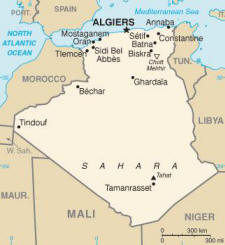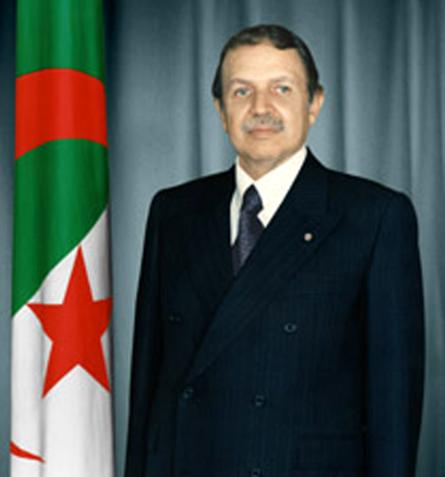


Country Profile Area: 2,381,740 sq km. Capital: Algiers Population: 34,178,188 (CIA 2009 est.) Language: Arabic (official), French, Berber dialects. Date of independence: 5th of July 1962. Currency: Algerian Dinars (DZD) Religion: Islam (majority), Christianity and Judaism. National Day: Revolution Day; 1 November. |
|
Algeria (Al Jaza'ir) is the second largest country in Africa after Sudan. It is situated in the North. Bounded by the Mediterranean Sea to the North, it shares borders with Morocco, Tunisia, Mali, Mauritania and Niger. It is mostly high Plateau and desert, with mountainous coastal plains. The countries climate is influence by the deserts of North Africa, with arid to semiarid vegitations. It has mild wet winters with hot dry summers along the coast and on the high plateaux. Algeria has a very rich cultural heritage dating back to several thousand years BC. The Barbers are thought to have inhabited the country long before the birth of the Roman Empire. Their culture and history would then be influenced by the rise and fall of several empires including the Roman, Spanish and Ottoman Empires, and by the coming of the Arabs who presently constitutes a very large per cent of the Algerian population. The colonization of the country by France over several decades is also a very important part of the country’s history. Algiers is the present capital and largest city in Algeria. The country is divided into 48 provinces and 553 districts among which are scattered several historical sites now designated UNESCO World Heritage Sites. Agriculture is a very important aspect of life in Algeria and products include; wheat, barley, oats, grapes, olives, sheep and cattle among others. Algeria is also very rich in Petroleum, Natural gas, Iron ore, Phosphate, Uranium, Lead and Zinc. |

Abdelaziz Boutefilka
President of Algeria
48 Provinces;
Adrar, Ain Defla, Ain Temouchent, Alger, Annaba, Batna, Bechar, Bejaia, Biskra, Blida, Bordj Bou Arreridj, Bouira, Boumerdes, Chlef, Constantine, Djelfa, El Bayadh, El Oued, El Tarf, Ghardaia, Guelma, Illizi, Jijel, Khenchela, Laghouat, Mascara, Medea, Mila, Mostaganem, M'Sila, Naama, Oran, Ouargla, Oum el Bouaghi, Relizane, Saida, Setif, Sidi Bel Abbes, Skikda, Souk Ahras, Tamanghasset, Tebessa, Tiaret, Tindouf, Tipaza, Tissemsilt, Tizi Ouzou, Tlemcen